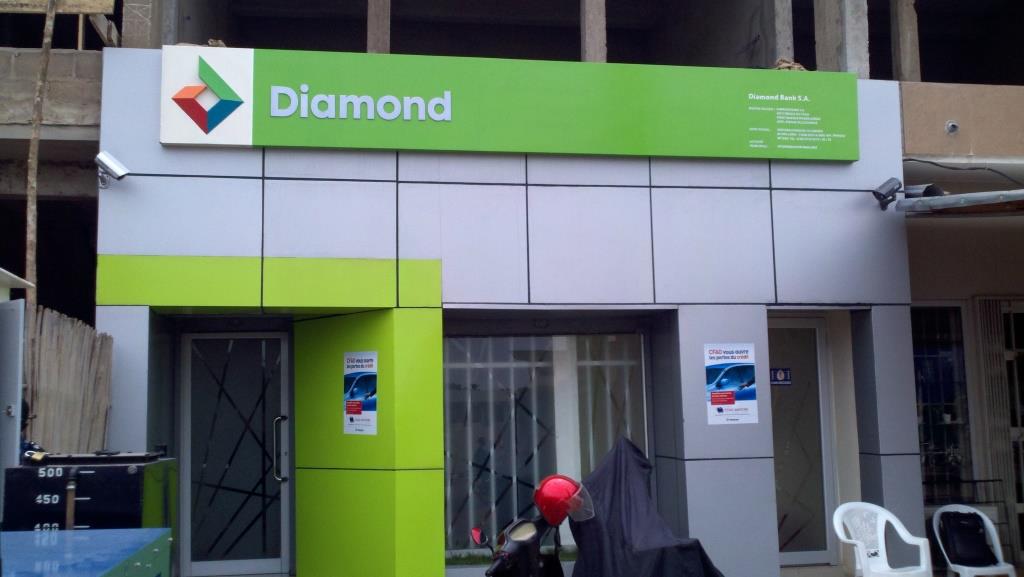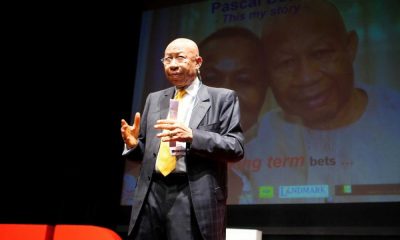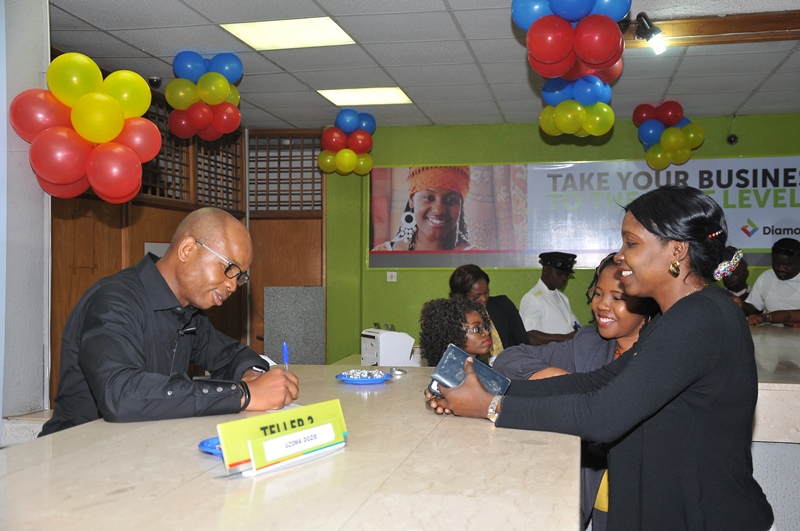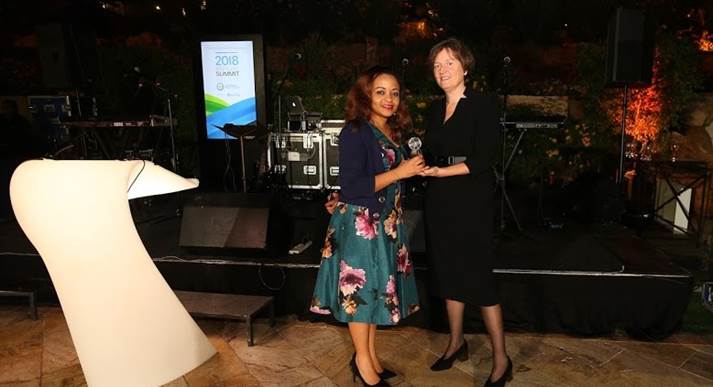Banking
Investors Dump Diamond Bank Shares amid Fears over Company’s Future

By Modupe Gbadeyanka
In order not to be caught unawares, some investors having shares of Diamond Bank Plc in their portfolio are beginning to offload them as a result of uncertainty over the financial institution’s future.
In recent times, Diamond Bank has not been churning out good results, a development Business Post gathered has given some shareholders of the mid-tier lender sleepless nights.
For example, the 2017 full year financial statements of Diamond Bank was nothing to write home about and just when some observers and investors thought things would get better in the first quarter of 2018, their expectations were cut short as the firm further failed to impress.
In its second quarter 2018 results, things did not get any better and so also in the third quarter.
In late September 2018, the Central Bank of Nigeria (CBN) revoked the operating licence of Skye Bank Plc, making shareholders of the lender lose their hard-earned money. This development triggered panic in the banking sector, especially among those in the same tier with Skye Bank, which the bank in focus is among.
Making matter worse for Diamond Bank was the downgrading of firm’s long and short-term issuer credit ratings by S&P as well as the recent reports of a possible acquisition of the company by a tier-1 bank, Access Bank Plc, though both have since denied this.
But what seemed to be more confusing was the resignation of Chairman of the bank, Mr Oluseyi Bickersteth, and three other directors last month, which reports said was to allow the rumoured new investors have their own representatives on the board of the firm.
Even Mr Bickersteth was quoted as saying in an interview that the board considered selling Diamond Bank to another bank, which the present management has described as untrue.
However, in order not to fall into a similar situation with Skye Bank, shareholders of Diamond Bank are already selling off their holdings, Business Post has learnt.
According to data from the Nigerian Stock Exchange (NSE), trading in Diamond Bank Plc, Ikeja Hotel Plc, and FBN Holdings Plc, (measured by volume) accounted for 708 million shares worth N1.8 billion in 1,957 deals, contributing 55.11 percent and 15.23 percent to the total equity turnover volume and value respectively last week.
Also, Diamond Bank, which opened last week at N1.28k per share, closed last Friday at 90 Kobo per share, indicating as 29.69 percent loss in one trading week.
But despite the troubles, the CEO of Diamond Bank, Mr Uzoma Dozie, has expressed optimism that all will be well.
According to him, the conclusion of the sale of Diamond Bank’s subsidiary in the United Kingdom this quarter and other strategies being put in place should propel the company back to profitability.
“As we move into the final quarter of the year, we expect headwinds to continue driven by emerging situations in developed economies as well as our domestic political realities.
“Despite this, our investors can expect a further decline in Non-Performing Loans (NPLs), a further increase in our digital footprint and completion of the sale of the UK subsidiary.
“Through these actions, we remain optimistic about the medium to long term outlook of Diamond Bank and its return to strong profitability,” Mr Dozie was quoted as saying in a statement issued last week by bank’s PR agency, Prize Communications Limited, which was obtained by Business Post.
Whether investors will take Mr Dozie for his words is one thing many cannot answer at the moment especially when some have blamed him for the bank’s recent misfortunes. In fact, some have even started to call for his removal as Diamond Bank MD/CEO.
Banking
Public Offer: Sterling Holdco Allots 13.812 billion Shares to 18,276 Shareholders

By Aduragbemi Omiyale
Sterling Financial Holdings Company Plc has allotted shares from its public offer of 2025 to investors with valid applications.
The allotment follows the earlier receipt of final approval from the Central Bank of Nigeria (CBN) and the recent clearance by the Securities and Exchange Commission (SEC).
In September 2025, the financial institution offered for sale about 12,581,000,000 ordinary shares of 50 kobo each at N7.00 per share in public offer.
However, the exercise received wide participation from the investing public, with the company getting 18,280 applications for 16,839,524,401 ordinary shares valued at approximately N117.88 billion.
Following a thorough verification process, valid applications were received from 18,276 shareholders for a total of 13,812,239,000 ordinary shares, representing a subscription level of 109.79 per cent and reflecting sustained confidence in Sterling Holdco’s strategic direction, governance, and long-term growth prospects.
The firm approached the capital market for additional funds for the recapitalisation of its two flagship subsidiaries, Sterling Bank and The Alternative Bank.
The capital injection will support the commencement of full operations and contribute to the group’s revenue diversification objectives.
In line with the guidelines set out in the offer prospectus, Sterling Holdco confirmed that all valid applications will be allotted in full. Every investor who complied with the terms of the offer will receive all the shares for which they applied.
A very small number of applications were not processed or were partially rejected due to non-compliance with the offer terms, including duplicate payments and failure to meet the minimum subscription requirement of 1,000 units or its multiples, as stipulated in the offer documents.
The group ensures a seamless post-offer process, with refunds for excess or rejected applications, along with applicable interest, to be remitted via Real Time Gross Settlement or NIBSS Electronic Funds Transfer directly to the bank accounts detailed in the application forms.
Simultaneously, the electronic allotment of shares has be credited to successful shareholders’ accounts with the Central Securities Clearing System (CSCS) on February 17, and for applicants who do not currently have CSCS accounts, their allotted shares will be temporarily held in a registrar-managed pool account pending the submission of their completed account opening documentation to Pace Registrars Limited, after which the shares will be transferred to their personal CSCS accounts.
Banking
CBN Governor Seeks Coordinated Digital Payment Reforms

By Modupe Gbadeyanka
To drive inclusive growth, strengthen financial stability, and deepen global financial integration across developing economies, there must be coordinated reforms in digital cross-border payments.
This was the submission of the Governor of the Central Bank of Nigeria (CBN), Mr Olayemi Cardoso, at the G‑24 Technical Group Meetings in Abuja on Thursday, February 19, 2026.
According to him, high remittance costs, settlement delays, fragmented systems, and heavy compliance burdens still limit the participation of households and Micro, Small and Medium Enterprises (MSMEs) in global trade.
The central banker emphasised that efficient payment systems are essential for economic inclusion, highlighting that global remittance corridors still incur average costs above 6 per cent, with settlement delays of several days, excluding millions from modern economic activity.
Mr Cardoso cautioned that while digital payments present significant opportunities, they also carry risks such as currency substitution, weakened monetary transmission, increased FX volatility, capital-flow pressures, and regulatory fragmentation.
The G-24 TGM 2026, themed Mobilising finance for sustainable, inclusive, and job-rich transformation, convened global financial stakeholders to advance the modernisation of finance in support of emerging and developing economies.
The CBN chief reaffirmed Nigeria’s commitment to working with G-24 members, the IMF, the World Bank Group, and other partners to build a more inclusive, resilient, and development-oriented global financial architecture.
“We have strengthened our AML/CFT frameworks in line with FATF guidelines, requiring strict dual-screening of cross-border transactions to mitigate risks.
“To deepen regional integration, the CBN introduced simplified KYC/AML requirements for low-value cross-border transactions to encourage broader participation in PAPSS, easing processes for Nigerian SMEs and enabling faster intra-African trade payments.
“We have also embraced fintech innovation through our Regulatory Sandbox, allowing payment-focused fintechs to test secure, instant cross-border solutions under close CBN supervision,” he disclosed.

Banking
Unity Bank, Providus Bank Merger Awaits Final Court Approval

By Modupe Gbadeyanka
The merger and business combination between Unity Bank Plc and Providus Bank Limited remains firmly on course, a statement from one of the parties disclosed.
According to Unity Bank, there is no iota of truth in reports in certain sections of the media suggesting that the merger process had stalled, as the transaction remains firmly on track.
It was disclosed that the necessary regulatory steps have been completed, but only a few other steps to finalise the transaction, especially the final court sanction.
There had been speculations that both lenders may not meet the new minimum capital requirement of the Central Bank of Nigeria (CBN) before the March 31, 2026, deadline.
However, it was noted that the combined capital base of Unity Bank and Providus Bank exceeds N200 billion, which is the minimum requirement to retain a national banking licence under the CBN’s recapitalisation framework.
When completed, the Unity-Providus merger is expected to deliver a stronger, more competitive, and customer-centric financial institution — one with the scale, innovation, and reach to redefine the retail and SME banking landscape in Nigeria.
“The merger with Providus Bank significantly enhances our capital base, operational capacity, and strategic positioning.
“We are confident that the combined institution will be better equipped to support economic growth and deliver innovative financial solutions across Nigeria,” the chief executive of Unity Bank, Mr Ebenezer Kolawole, stated.
Recall that a few months ago, shareholders authorised the merger between the two entities at Court-Ordered Meetings. They also adopted the scheme of merger at their respective Extraordinary General Meetings (EGMs) in September 2025,
The central bank also backed the merger, with a pivotal financial accommodation to support the transaction. The merger also received a further boost with a “no objection” nod from the Securities and Exchange Commission (SEC).
The regulatory approvals form part of broader efforts to strengthen the resilience of Nigeria’s banking system, reinforce capital adequacy across the sector, and mitigate potential systemic risks.
The development positions the combined entity among the 21 banks that have satisfied the apex bank’s new capital threshold for national banking operations.
-

 Feature/OPED6 years ago
Feature/OPED6 years agoDavos was Different this year
-
Travel/Tourism10 years ago
Lagos Seals Western Lodge Hotel In Ikorodu
-

 Showbiz3 years ago
Showbiz3 years agoEstranged Lover Releases Videos of Empress Njamah Bathing
-

 Banking8 years ago
Banking8 years agoSort Codes of GTBank Branches in Nigeria
-

 Economy3 years ago
Economy3 years agoSubsidy Removal: CNG at N130 Per Litre Cheaper Than Petrol—IPMAN
-

 Banking3 years ago
Banking3 years agoSort Codes of UBA Branches in Nigeria
-

 Banking3 years ago
Banking3 years agoFirst Bank Announces Planned Downtime
-

 Sports3 years ago
Sports3 years agoHighest Paid Nigerian Footballer – How Much Do Nigerian Footballers Earn

















